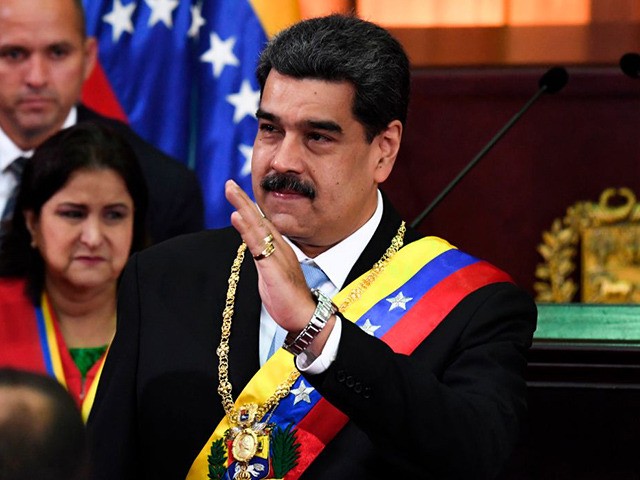Venezuelan dictator Nicolás Maduro pardoned dozens of opposition leaders on Monday ahead of December’s parliamentary elections.
Among those to receive a pardon include legislator Freddy Guevara, who has been living in asylum at the Chilean Embassy; Roberto Marrero, who served as President Juan Guaidó’s chief of staff; and lawmakers Gilber Caro y Renzo Prieto, both of whom were incarcerated at a military facility.
Many others pardoned were involved in the failed 2019 rebellion attempt that sought to persuade members of the military to stop supporting the Maduro regime and recognize Guaidó as the country’s rightful president. The National Assembly used its constitutionally granted powers to appoint Guaidó president in 2019 after Maduro refused to step down following the end of his term.
“We hope that these measures taken by the Bolivarian government help maintain the democratic focus of all of these political actors,” Information Minister Jorge Rodríguez said at a news conference. “The government’s intention is to deepen the process of national reconciliation for the national union so that political issues are settled by peaceful means and by electoral means.”
Despite being framed as a goodwill gesture, opposition to the regime was immediately suspicious of the move, suggesting there was an ulterior motive.
“Maduro isn’t president and I’m not a delinquent,” wrote lawmaker Americo de Grazia, who lives in exile but was among those mentioned in the decree. “If you want to contribute to peace, give Venezuela a pardon from your usurpation of power.”
#IndultoOInsulto ni Maduro es presidente, ni yo soy delincuente. Si Ud quiere contribuir a la paz de Venezuela indulte al país de la usurpación del poder, renuncie a la ocupación fáctica de la tragedia que ha sometido a nuestro pueblo y quizás así tengamos algo que agradecerle.
— Americo De Grazia (@AmericoDeGrazia) August 31, 2020
The most likely motive, as effectively admitted by Rodríguez, is to build a sense of legitimacy around December’s parliamentary elections, which give Maduro the chance to take back control of the National Assembly, the country’s last legitimate and democratically elected lawmaking body,
The majority of opposition leaders have pledged to boycott the vote, citing the fact that practically all major elections over the past decade have been rigged in the United Socialist Party of Venezuela’s (PSUV) favor. The most notable of all these election frauds was the 2018 presidential election, when Maduro banned most opposition leaders from running and declared a “landslide victory” in a country where polls said more than 80 percent want him removed from power. In June, the socialist-controlled Supreme Court also appointed a fresh set of pro-Maduro electoral authorities, increasing the regime’s power over all aspects of future elections.
However, some opposition leaders are considering participation in the upcoming elections. Last month, Guaidó proposed forming an electoral pact of all opposition parties to “avoid parliamentary fraud” and lead to “massive citizen participation.” The leader of the conservative Vente Venezuela party, María Corina Machado, slapped down the idea after a “frank” conversation with Guaidó this weekend.
“The country is very clear that we are facing a criminal regime, there is nothing more to consult,” contended Machado, who is Venezuela’s only right of center leader. “It is not true that Venezuelans have only to choose between the indefinite permanence of Nicolás Maduro, through electoral farces, or the indefinite permanence of the interim government, through plebiscite consultations.”
Follow Ben Kew on Parler, Facebook, or Twitter. You can email him at bkew@breitbart.com.

COMMENTS
Please let us know if you're having issues with commenting.